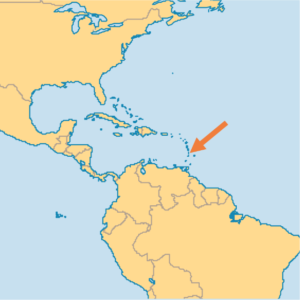NOVEMBER 6- TODAY’S READING FROM THE ONE YEAR BIBLE- Ezekiel 14:12-16:41; Hebrews 7:18-28; Psalm 106:1-12; Proverbs 27:4-6
HEADLINES FROM TODAY’S BIBLE READINGS:
Here are today’s top stories:
EZEKIEL 14- Israel’s Dream Team Lawyers Fail to Persuade Supreme Court; Noah, Daniel, and Job are unable to produce sufficient evidence to avert National Death Sentence.
EZEKIEL 15- God Offers His Choice Vine as Firewood. Unnatural Crop Failure Renders Celebrated Vineyard Useless
EZEKIEL 16 – A Cinderella Story gone tragically wrong; Greatest Marriage Betrayal in Known History- God’s Orphan Queen Dumps Divine Husband for Low Life Prostitution
HEBREWS 7- A Fail-Safe Cure from Fatal Disease Introduced; Approach to God Guaranteed by Divine Oath and The Work of Indestructible Priest and King;
PSALM 105- Singer-Songwriter Confesses That He Cannot Fully Express His Gratitude for God’s Goodness in Salvation
TODAY’S READING FROM THE OLD TESTAMENT- Ezekiel 14:12-16:41
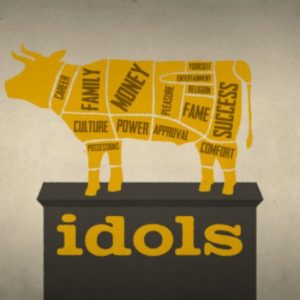 Perhaps Judah’s elders-in-exile thought that if they had a prayer meeting, they could intercede for Jerusalem and avert the disaster predicted by Ezekiel. They are in for a surprise.
Perhaps Judah’s elders-in-exile thought that if they had a prayer meeting, they could intercede for Jerusalem and avert the disaster predicted by Ezekiel. They are in for a surprise.
First, the Lord denounces the elders, letting them know that their efforts in prayer were hypocritical. They were pretending to be sorry for the sins of their brothers back in Jerusalem, yet were secretly practicing and enjoying the same sins in their own hearts. The Lord says through the prophet Ezekiel that He recognizes their hidden idols. They are pretending to seek the mind of the Lord when they as just as unrepentant of their sins as the remnant remaining in Judah.
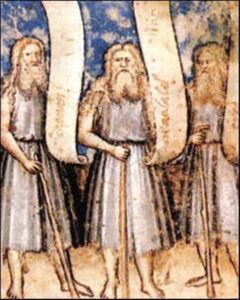 The Lord lets them know that, in this case, even the prayers of their most righteous men could not save the city. It was that polluted. Not even the intercession of such righteous men as Noah, Daniel, and Job could avert the prophesied judgment (Ezekiel 14:14, 16, 18, 20).
The Lord lets them know that, in this case, even the prayers of their most righteous men could not save the city. It was that polluted. Not even the intercession of such righteous men as Noah, Daniel, and Job could avert the prophesied judgment (Ezekiel 14:14, 16, 18, 20).
The Lord promises four dreadful judgments will come to their homeland: judgments by sword, famine, wild beasts, and plague. Their food supply will be destroyed. Yet because of God’s mercy and His promise of a future restoration, a small remnant of sons and daughters will be spared (14:22).
Ezekiel 14:22-23 22 But behold, some survivors will be left in it, sons and daughters who will be brought out; behold, when they come out to you, and you see their ways and their deeds, you will be consoled for the disaster that I have brought upon Jerusalem, for all that I have brought upon it. 23 They will console you, when you see their ways and their deeds, and you shall know that I have not done without cause all that I have done in it, declares the Lord GOD.”
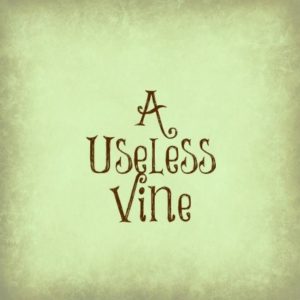 In Ezekiel 15, the Lord once again refers to Israel as His own vine. (See Psalm 80, Isaiah 5, 27; Jeremiah 2, Hosea 10 and Matthew 21, and John 15.) However, there is no life left in this vine. It was planted and tended most carefully by the Lord Himself. Yet, through its own wayward nature, it failed to produce fruit. Israel proved to be a false vine. The Vinedresser found no purpose in keeping it. Its dead branches were useless for anything constructive. It had not even the moral fiber, the inherent strength, to produce the smallest peg to hang anything on. Its dead branches were only fit to be burned.
In Ezekiel 15, the Lord once again refers to Israel as His own vine. (See Psalm 80, Isaiah 5, 27; Jeremiah 2, Hosea 10 and Matthew 21, and John 15.) However, there is no life left in this vine. It was planted and tended most carefully by the Lord Himself. Yet, through its own wayward nature, it failed to produce fruit. Israel proved to be a false vine. The Vinedresser found no purpose in keeping it. Its dead branches were useless for anything constructive. It had not even the moral fiber, the inherent strength, to produce the smallest peg to hang anything on. Its dead branches were only fit to be burned.
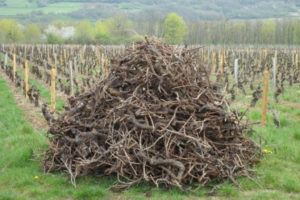 The illustration underscores the sole purpose of the vine: to bring forth fruit for the satisfaction of the Vine Keeper. If it fails at that, it completely fails.
The illustration underscores the sole purpose of the vine: to bring forth fruit for the satisfaction of the Vine Keeper. If it fails at that, it completely fails.
In John 15, Jesus teaches that He is the True Vine in Whom the Vinedresser (the Father) takes pleasure. He has eternal life, and eternal life produces eternal fruit. He grafts in those who believe in Him. However, apart from abiding in Him, we betray any potential for fulfilling our purpose of bringing forth fruit for the glory of the Father.
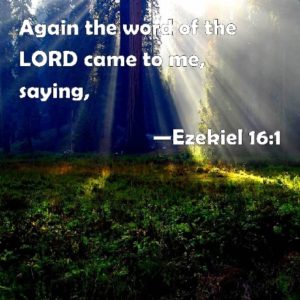 The sixty-three verses of Ezekiel Chapter 16 contain the longest single prophetic message in the Book. Ezekiel is given another illustration of the sad condition of God’s people. It follows the thought of the previous chapter. In failing to produce good fruit, Israel prostituted its calling. God’s covenant bride has betrayed Him.
The sixty-three verses of Ezekiel Chapter 16 contain the longest single prophetic message in the Book. Ezekiel is given another illustration of the sad condition of God’s people. It follows the thought of the previous chapter. In failing to produce good fruit, Israel prostituted its calling. God’s covenant bride has betrayed Him.
The story is told of how Israel, once orphaned and abandoned by the fall of her idolatrous parents, was adopted, cleansed, adorned, betrothed, and wed to the Gracious King, who not only took her to Himself as His only bride but gave her every good gift imaginable. Yet, in rebellion, she turned her back on His kindness to become a harlot.
 Israel was chosen by the King. She became the wife of Yahweh. Spreading the corner of His garment over her, which was a ritual signifying that a man was willing to take a woman to be His covenant bride, He was pledging to cover her every need. He was demonstrating the commitment of His love.
Israel was chosen by the King. She became the wife of Yahweh. Spreading the corner of His garment over her, which was a ritual signifying that a man was willing to take a woman to be His covenant bride, He was pledging to cover her every need. He was demonstrating the commitment of His love.
Ezekiel 16:9-14 9 Then I bathed you with water and washed off your blood from you and anointed you with oil. 10 I clothed you also with embroidered cloth and shod you with fine leather. I wrapped you in fine linen and covered you with silk. 11 And I adorned you with ornaments and put bracelets on your wrists and a chain on your neck. 12 And I put a ring on your nose and earrings in your ears and a beautiful crown on your head. 13 Thus you were adorned with gold and silver, and your clothing was of fine linen and silk and embroidered cloth. You ate fine flour and honey and oil. You grew exceedingly beautiful and advanced to royalty. 14 And your renown went forth among the nations because of your beauty, for it was perfect through the splendor that I had bestowed on you, declares the Lord GOD.
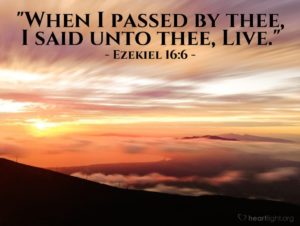 Although this parable pertains to Israel at the time of the exile, it parallels our salvation story. We were orphaned by the fall and needed to be cleansed from our Adamic heritage of sin by the shed blood of the sinless Substitute. He clothed us, adorned us, and betrothed us to Himself. It is important for us to be presented to Him as a chaste bride.
Although this parable pertains to Israel at the time of the exile, it parallels our salvation story. We were orphaned by the fall and needed to be cleansed from our Adamic heritage of sin by the shed blood of the sinless Substitute. He clothed us, adorned us, and betrothed us to Himself. It is important for us to be presented to Him as a chaste bride.
This ‘Cinderella story’ takes a tragic turn, however. We hear the sad news of Israel’s unfaithfulness to her Husband. She turns to any old lover as she plays the harlot, picturing her idolatry.
Ezekiel 16:15-16 15 “But you trusted in your beauty and played the harlot because of your fame, and you poured out your harlotries on every passer-by who might be willing. 16 “You took some of your clothes, made for yourself high places of various colors and played the harlot on them, which should never come about nor happen.
What a shocking betrayal! Yet how easily our sin nature self-righteously convinces us to trust in our own wisdom, strength, talents, and accomplishments. It seeks the affections of other lovers while failing to love the Lord our God with all its heart, mind, and soul.
As one Biblical commentary writer, Lamar Cooper puts it, “The girl once left for dead, who was nurtured to maturity and who became the bride of her benefactor, also became unfaithful. The reasons for the fall of the nation are presented poignantly in this section. Ezekiel enumerated at least eight reasons for the exile: pride (v.15a), spiritual prostitution (v.15b-19), materialistic idolatry (v. 16-19), human sacrifices (v.20-21), forgetting God (v.22), propagating her prostitution (v.23-25), trusting relationship with pagan nations (v. 26-29) and a weak will that cast off all moral restraints (v.30-34).
Then the prophet announces judgment in the strongest terms: She will be punished as would a convicted adulteress under the law of Moses (Ezek 16:36-41).
TODAY’S READING FROM THE NEW TESTAMENT – Hebrews 7:18-28
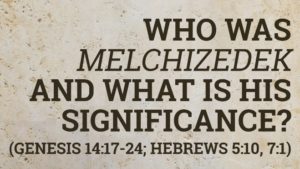 The writer of Hebrews reminds us of additional important information concerning the mysterious Priest Melchizedek. He represents a transcendent priesthood (predating and excelling that of the Old Testament Priesthood of Aaron, a priesthood proved to be subservient because tithes are always given from the lesser to the greater). He also represents a transcendent life (in that he has no beginning or ending of days recorded in his history), but He is of ROYAL LINEAGE. Priests were to represent man to God. Kings were to represent God’s rule to man. This Melchizedek had a distinctive NAME (King of Righteousness) and ruled over a distinctive place (SALEM- meaning peace). We get this information from Genesis 14:17-24) when Melchizedek mysteriously appears as the representative of the Most High God and offers fellowship, bread, and wine, in honor of the God-given victory and rescue of His kinsman.
The writer of Hebrews reminds us of additional important information concerning the mysterious Priest Melchizedek. He represents a transcendent priesthood (predating and excelling that of the Old Testament Priesthood of Aaron, a priesthood proved to be subservient because tithes are always given from the lesser to the greater). He also represents a transcendent life (in that he has no beginning or ending of days recorded in his history), but He is of ROYAL LINEAGE. Priests were to represent man to God. Kings were to represent God’s rule to man. This Melchizedek had a distinctive NAME (King of Righteousness) and ruled over a distinctive place (SALEM- meaning peace). We get this information from Genesis 14:17-24) when Melchizedek mysteriously appears as the representative of the Most High God and offers fellowship, bread, and wine, in honor of the God-given victory and rescue of His kinsman.
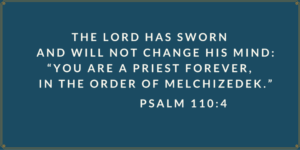 But there is another reference to Melchizedek in Scripture. This reference is not in relationship to Abraham but to David, many generations later. It is found in the Messianic Psalm -Psalm 110. Not only is Melchizedek greater than Abraham, receiving tithes from him, but he is greater than David. He is David’s Lord and King.
But there is another reference to Melchizedek in Scripture. This reference is not in relationship to Abraham but to David, many generations later. It is found in the Messianic Psalm -Psalm 110. Not only is Melchizedek greater than Abraham, receiving tithes from him, but he is greater than David. He is David’s Lord and King.
Psalm 110:1-4 1 The LORD says to my Lord: “Sit at my right hand, until I make your enemies your footstool.” 2 The LORD sends forth from Zion your mighty scepter. Rule in the midst of your enemies! 3 Your people will offer themselves freely on the day of your power, in holy garments; from the womb of the morning, the dew of your youth will be yours. 4 The LORD has sworn and will not change his mind, “You are a priest forever after the order of Melchizedek.”
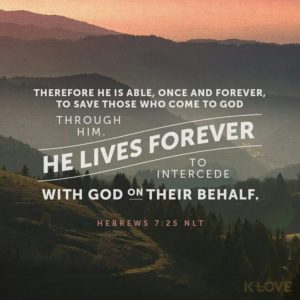 The LORD (Yahweh) is speaking to David’s Lord. (Jesus claims this reference as pertaining to Himself in Matthew 22:42). The LORD GOD is saying that all authority and power is given to Him (The Messiah-David’s descendant, yet David’s King).
The LORD (Yahweh) is speaking to David’s Lord. (Jesus claims this reference as pertaining to Himself in Matthew 22:42). The LORD GOD is saying that all authority and power is given to Him (The Messiah-David’s descendant, yet David’s King).
Here’s the vital new information provided by Psalm 110: God Himself swears by His own existence, with an unbreakable oath, assuring that He will not change His mind, that David’s Lord/God/King, the Christ (in Hebrew, the Messiah) will not only be King according to the Davidic covenant (2 Samuel 7:12-13) but an eternal priest, a perfect, unfailing priest, a priest of a line that transcends the stipulations of the Mosaic covenant regulating the imperfect, transitory and temporal nature of the Levitical priesthood. To the Christ, God says, “You are a ‘forever priest’ (a perfect, permanent priest) after the order of Melchizedek. He “ever lives” and “never fails” to make intercession for us! (Hebrews 7:25).
This priest, unlike Aaron and his sons, did not need to offer sacrifices for himself. He was sinless. This priest offered the perfect sacrifice- Himself. This sacrifice was ‘once and for all’. It did not need to be repeated. This priest is the first ever recorded to have ‘sat down’. His work was finished! This is what Jesus declared from the cross! (John 19:30).
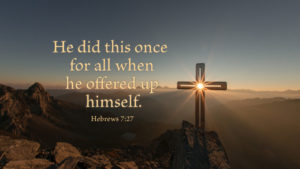 The law did not give mankind a perfect priest. God did. And He did so with an oath. You can’t top that.
The law did not give mankind a perfect priest. God did. And He did so with an oath. You can’t top that.
Hebrews 7:26 26 For it was indeed fitting that we should have such a high priest, holy, innocent, unstained, separated from sinners, and exalted above the heavens.
The NIV captures the thought well:
Hebrews 7:26 26 Such a high priest meets our need–one who is holy, blameless, pure, set apart from sinners, exalted above the heavens.
TODAY’S READING FROM THE BOOK OF PSALMS – Psalm 106:1-12
Here is a prayer of repentance and submission to the Lord:
This portion of the Psalm makes us think about the words of the thief on the cross, as he recognizes his desperate need for Christ as His King and Savior.
The Psalmist said:
Psalm 106:4 4 Remember me, O LORD, when you show favor to your people; help me when you save them,
The thief said:
Luke 23:42 42 Then he said, “Jesus, remember me when you come into your kingdom.”
The Psalmist said:
Psalm 106:6 6 Both we and our fathers have sinned; we have committed iniquity; we have done wickedness.
The thief said:
Luke 23:41 41 We are punished justly, for we are getting what our deeds deserve. But this man has done nothing wrong.”
The Psalmist said:
Psalm 106:8 8 Yet he saved them for his name’s sake, to make his mighty power known.
Jesus said:
Luke 23:43 43 Jesus answered him, “I tell you the truth, today you will be with me in paradise.”
The Psalmist said:
Psalm 106:10 10 He saved them from the hand of the foe; from the hand of the enemy He redeemed them.
We join them and say:
Psalm 106:1-2 1 Praise the LORD. Give thanks to the LORD, for He is good; His love endures forever. 2 Who can proclaim the mighty acts of the LORD or fully declare his praise?
Give thanks to the Lord, for He IS good!
TODAY’S READING FROM THE BOOK OF PROVERBS – Proverbs 27:4-6
Proverbs 27:4-6 4 Wrath is cruel, anger is overwhelming, but who can stand before jealousy? 5 Better is open rebuke than hidden love. 6 Faithful are the wounds of a friend; profuse are the kisses of an enemy.
Faithful friends will speak the truth in love. Sometimes what they say may hurt our feelings but also save us from trouble. Those who seek our downfall will often pretend to be our friends.
Here is another proverb reminding us to choose honest-to-God friends!
PRAY FOR THE NATIONS – ST. LUCIA
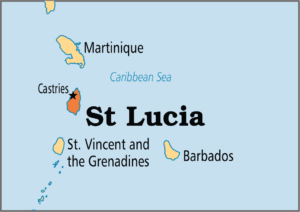 You can see why this beautiful island is popular with tourists, yet its people and its many visitors are in great need of the Savior.
You can see why this beautiful island is popular with tourists, yet its people and its many visitors are in great need of the Savior.
(Prayer Information from “Operation World Prayer Guide” and Prayercast.com)
St Lucia
Caribbean
Geography
Area: 617 sq. km
Windward Islands between Martinique and St Vincent. One of the most beautiful islands in the Caribbean.
Population: 173,942 Annual Growth: 1.04%
Capital: Castries
Urbanites: 28%
HDI Rank: 69 of 182 (UN Human Development Reports 2009)
Peoples
Official language: English, but 80% speak French Creole (Kweyol) Languages: 2 All languages
Religion
Largest Religion: Christian
|
Religion |
|
Pop % |
Ann Gr |
|
165,384 |
95.08 |
1.0 |
|
|
25,303 |
14.5 |
3.2 |
https://prayercast.com/saint-lucia.html
With breathtaking Caribbean beaches, lush rainforests, and majestic mountains, Saint Lucia’s magnificent landscape is an idyllic destination. Roughly halfway into the Eastern Caribbean chain, the island draws much of its economic stability from tourism. Saint Lucia’s culture stems from its African, French, and British influences, making it deeply rich and diverse.
Contested for many years, this island nation was passed between England and France fourteen times until it declared its independence in 1979. Because of this, Saint Lucia has maintained elements of both cultures. Although ruled by Britain for 165 years, the people’s dialect and Catholicism reach back to the French. Most islanders are descendants of slaves, adding an African thread to this beautiful cultural tapestry. Once dependent on sugar plantations, the island now produces a large banana crop and enjoys a very stable economy.
Just like its culture, the island has a diverse religious background. Today 95% of the island claim Christianity, and 55% of those are Catholic. But, for many, this is a cultural identity more than a true and living faith. Some African religious traditions also influence the island’s spirituality, with many embracing aspects of a folk religion called obeah. Many, even within the Christian faith, will practice certain rituals to protect themselves from the spirit world. Some believe obeah can heal the sick and also bring revenge on their enemies. With church attendance on the decline, 86% of children born out of wedlock, and many families broken and divided, the people of Saint Lucia are in desperate need of revival. With the Bible recently translated into Creole, true Biblical teaching and Gospel understanding is now increasingly possible. A solid Biblical foundation would give the Church the roots it needs, protecting it from moral decline and freeing it from fear of the spirit world.
Evangelically oriented churches have multiplied – as have divisions. Pray for true unity amid the increasing diversity so that churches can offer a united front for the gospel’s sake. The Fellowship of Gospel Preaching Churches is working to develop that unity in practical terms.
PRAYER: O Faithful God and Father of our Lord Jesus Christ, may we never forget the gracious rescue provided for us in the reconciliation won for us at the Cross. We need not look anywhere else for our satisfaction than in the glorious person of Your Son. He is our daily bread, and He alone can nourish our soul. Lord Jesus, You are a faithful friend. Thank You for exhibiting and declaring true truth! We pray that our minds will continue to be renewed as we study Your Word, embrace it by faith, and live it out in obedience. In Your precious Name, we ask it. Amen.
-Pastor David

